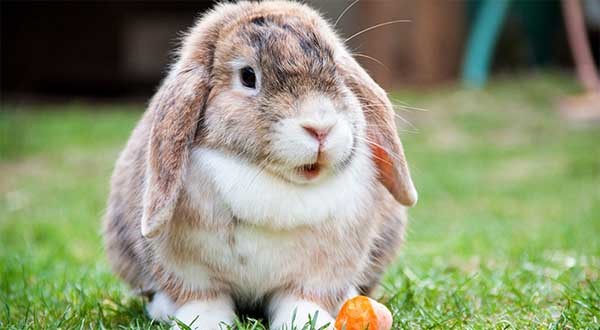What Is a Healthy Weight for My Rabbit?

The weight of your rabbit should stay reasonably consistent once they are an adult. Any weight loss or weight gain may suggest an underlying health issue or indicate that you need to make some adjustments to their everyday diet.
As leading UK suppliers of professional veterinary scales, we’ve created the following guide to help you determine a healthy weight for your rabbit.
Pet rabbits are often less active than those in the wild as they do not need to forage for food, flee from danger or struggle to survive in cold conditions, this means that pet rabbits often use less energy and can easily become overweight, or obese.
This weight gain can cause a wide range of problems for pet rabbits, including strain on the cardiovascular system and arthritis. Overweight rabbits can also find self-grooming difficult which can sadly lead to the often fatal flystrike condition.
How Much Should My Rabbit Weigh, Ideally?
The ideal weight of a rabbit varies from rabbit to rabbit, even for those that are the same breed. When establishing whether your rabbit is a healthy weight, you should compare your rabbit’s weight reading to its normal weight and body shape rather than its specific breeds average weight.
It can often prove challenging to judge the weight of a rabbit visually. Their thick fur can disguise the fat of an overweight rabbit or hide the prominent bones of an underweight rabbit. The best way to investigate if your rabbit is a healthy weight is to feel its body shape.
Rabbits of a healthy weight will have a smooth curve from their neck to their tail, and from one hip to the other. You should be able to feel the rounded spine and padded ribs of a healthy rabbit rather than any sharp bones. Many rabbits, especially females, also have a dewlap which is a roll of fur under the chin and should feel like a fold of skin rather than fatty when lightly pinched.
If you have any concerns over your pet rabbit's weight, then please contact your vet for a professional opinion.
Is My Rabbit Overweight?
Rabbits that are over a healthy weight often have rolls of fat around their tail and ankles. The dewlap also becomes a lot larger and feels plump to the touch. The hips, rib and spine of an overweight rabbit also become more difficult to feel under the layers of fat.
Some severely obese rabbits may carry some extra fat on the chest and stomach that can hang down and cause mobility issues. Also, if your rabbit has no obvious waist from an overhead perspective then they may need to lose some additional fat.
If your rabbit has gained some excess weight then you may need to adjust its diet as you may be overfeeding your pet with too energy-rich food which is then being stored as fat.
For a more healthy balanced diet, you should feed your rabbit less dry food, choose a brand that is high in fibre and let them snack on fresh leafy greens and hay. You should also try to introduce more movement and exercise into your rabbit's daily routine.
Is My Rabbit Underweight?
Rabbits that are under a healthy weight often have prominent pelvis bones and the ridges of both their spines and ribs feel sharp to touch. Severely underweight rabbits may have depressions or sunken areas both sides of the pelvis and spine. Some underweight rabbits may also find it difficult to move if their legs are too thin due to fat and muscle loss.
To help your rabbit achieve a healthy weight, you may need to increase the amount of energy-rich food in their diet as they are likely to be using stored energy. Unfortunately, when rabbits lose a significant amount of weight it often indicates a medical problem and so you should always consult your vet if your rabbit is struggling to maintain a healthy weight.
Weigh Your Rabbit With a Professional Veterinary Scale
Professional veterinary scales from Marsden can help you to make an accurate reading of your rabbit’s weight and keep track of any weight loss or weight gain. We offer a wide range of veterinary scales, however for smaller pets like rabbits we recommend choosing one of our vet scales with a lower capacity as these will provide you with more precise graduations.
Take a look at the portable Marsden V-22 Veterinary Scale with a smaller weighing platform for rabbits or guinea pigs.
To find out more about any of our Marsden veterinary scales email sales@marsdengroup.co.uk or call our team of weighing experts on 01709 364296.
Related Products
Further Reading
What is a healthy weight for my horse?